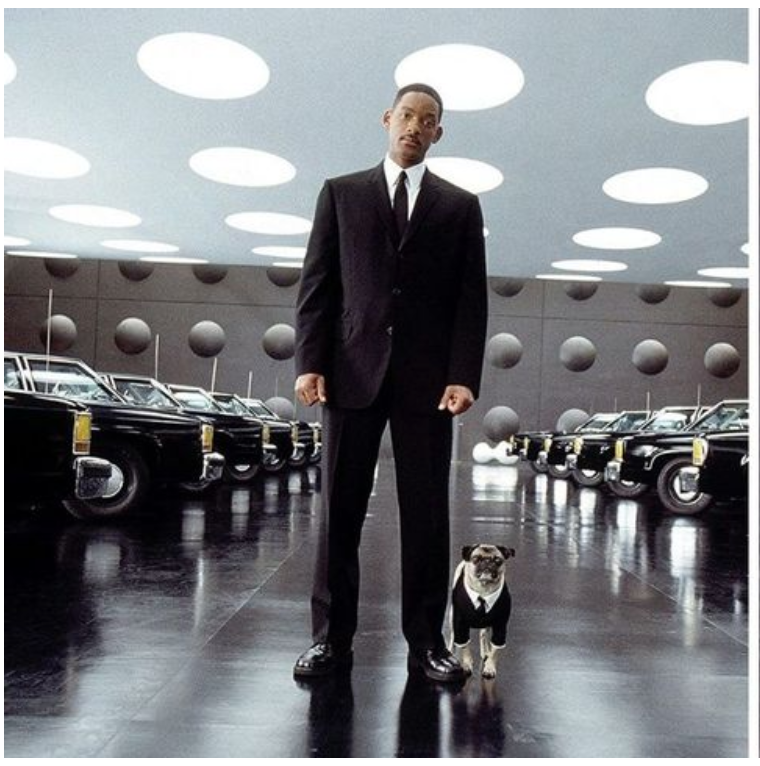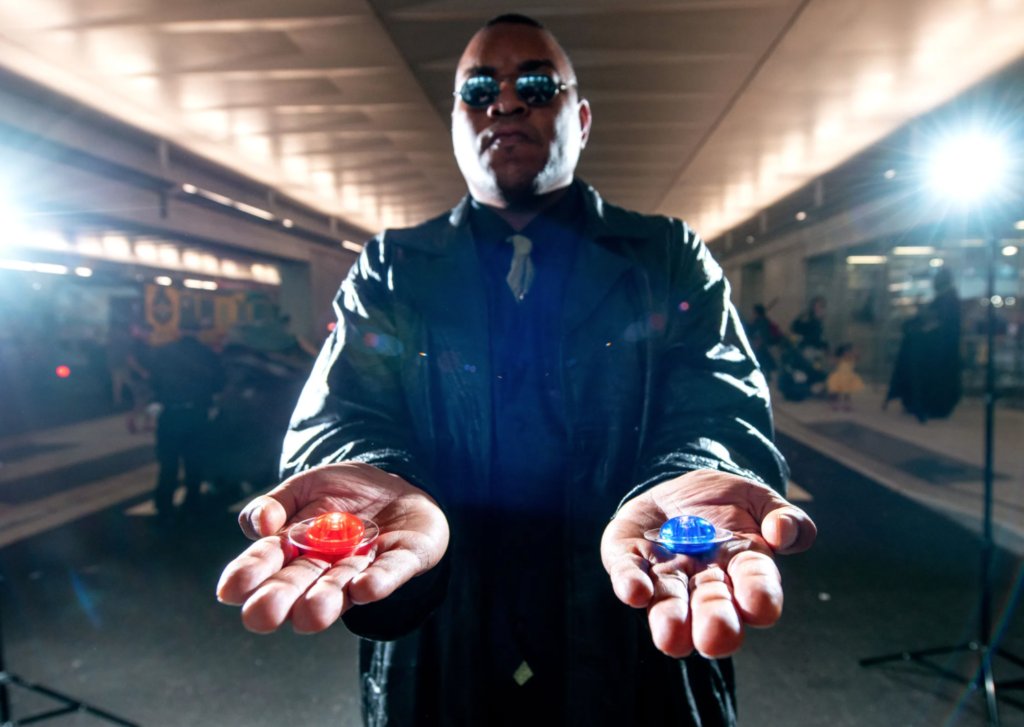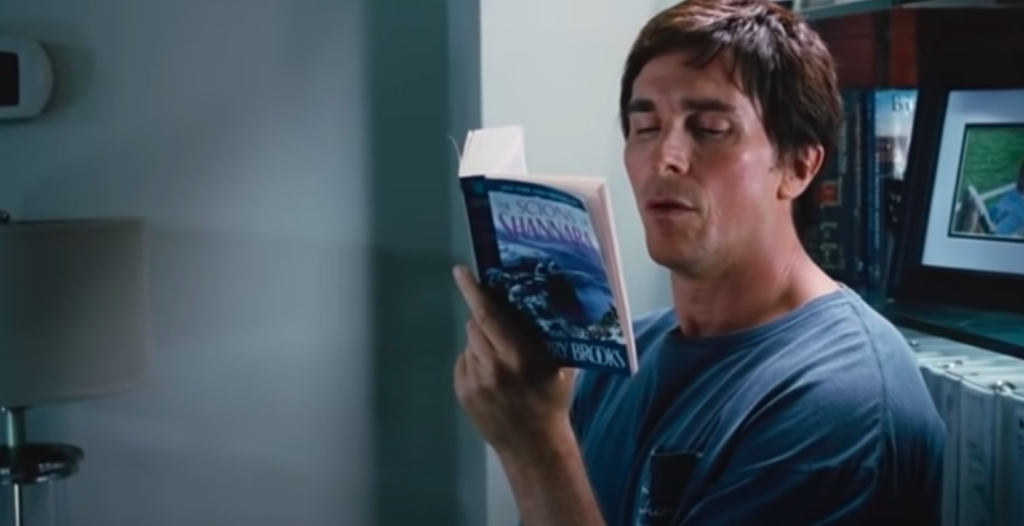HUGE spoilers ahead – but this storyline has been around for like, 4 decades in various versions – 2 tv series and middle school book series, anyways… Think Harry Potter without (most of the) boys. Author Jill Murphy began writing the series while she herself was still in high school, then putting the project on hold while she finished college. The current tv series is filmed in castles in the UK and Germany. I like it better than HP, because no one finds out they have inborn (magical) talent that makes everything easy for them, AND a secret bank account squirrelled away by their late parents, that allows them unlimited spending, all on the other side of Platform 9 3/4…
(In case you’re wondering, then-13 year old Bella Ramsey was “discovered” the prior year on Game of Thrones, where she played the fierce and competent child ruler Lady Lyanna Mormont well enough to warrant GOT writers expanding her part.)
(Yes, she is killed in battle on GOT. No, I never otherwise watched GOT.)
A-nyway, at Cackles’ Academy, the girls get into all kinds of predicaments, the rivalries are fierce, the parental expectations riveting, the friendships heartwarming… and the mum-daughter-other daughter competition and sister love-hate relationships can touch a nerve. The manipulativeness of one of the high-achieving main characters in particular begs the question – if she had been a boy, would she have felt the need to come up with quite so many elaborate ruses to prove her abilities and self worth? Why?
All the time we’re watching Witch, I’m wondering if the creating-own-crisis-to-swoop-down-and-save-the-day storyline would have been feasible if instead this was a boys’ school. Answer is – I have no idea. A thing about Mars and Venus comes to mind. And so the story goes…)
Mildred Hubble is a plain, ordinary girl living with her struggling single mum, until the day tubby and bespectacled Maud Spellbody crashes into her on the way to a middle school admissions test. Maud has broken her glasses, so Mildred agrees to help her get to the school. On Maud’s broomstick.
The school Maud is trying to get into turns out to be a boarding school for young witches. During the haphazard broomstick journey that ends publicly in the school’s fishpond, the girls become fast friends. Maud is convinced Mildred has magic in her ancestry as well, because she can see the magical things happening around her. She coaxes Mildred into trying for a spot at the school, and uses her old witching family name to wrangle Mildred a test seat at the last minute. Mildred goes along with it because besides liking Maud, if you make Witch you get a cat – and she’s always wanted a cat.
Mildred naturally bungles about failing everything miserably, and the girls’ subterfuge is soon uncovered, much to the teachers’ outrage. Maud is given a severe dressing down, saved only by the teachers’ memories that her alumni mother also got into well-intentioned trouble of similar sort. Mildred is quickly and unceremoniously dismissed. As she is leaving in utter disgrace, a coup occurs, leading to the ousting of the much-beloved (moderate) current school leadership based on technicalities of the old witching laws.
Unbound by the strict codes of conduct of the “real” witches, Mildred barges in, tampering with the extremist witches’ spell and swinging the balance firmly back with the original leadership, thus earning herself a legitimate admissions interview and, later, a probationary period at the school.
(I like how the writers think witches and potions are more believable in the plot than successfully faking your way into an admissions test and winging it to score a spot.. AND they don’t even live in Hong Kong :D)
Thus begin the adventures of the very worst witch in the world, as she attends Cackle’s Academy alongside daughters from some of the most blue-blooded old families in the Magic Council. She will come to bemoan her mother’s lack of witching education, and then resent that her mother “didn’t give (her) the right start in life,” resulting in her “always” being behind in witching studies. (HOLD ON – look out for the contrast further down, with the blue blooded witching family described later on…)
Never the star student, Mildred is often just one step away from being kicked out, but occasionally claims coveted prizes for unconventional creativity in her projects…. when she’s not being disqualified, that is – for faux pas or not following procedures within the witches code that the other girls have learnt all their lives. (Again, I like how realistic this is, for creativity of the sort that encourages wild departure from convention often also risks rebellion and maybe even anarchy, it can be a fine line and a fine balance, between the two. Everything’s a “package” of goods and bads <shrugs>) And so what happens to Mildred Hubble and her friends on their adventures is true enough to real life (despite all the broomstick flying) to be relatable, believable… and covertly inspirational.
At times Mildred really does get herself expelled. It reinforces that a lack of respect for (or knowledge of) rules is never without consequence. Indeed, one of her good friends Enid Nightshade has 17 previous expulsions under her belt – however, rather than being a poor student or a mean girl, she openly admits (rather than blames someone else, which another character, the high-achieving Ethel Hallow, frequently does) she deliberately gets into trouble because otherwise her rockstar celebrity parents are often on concert tours. A potential expulsion means they drop everything to come in. (Her dad wryly takes pride when it’s announced she’s second worst witch (Mildred being the worst) in school. Also interesting that it never crosses the minds of the Nightshades that their daughter might be stupid or mean (she’s not). Even more hilariously in one episode, it falls to good-intentioned Maud Spellbody’s plain ordinary non-celebrity dad to pull the biggest prank, thereby saving all three girls from expulsion following yet another well-meaning chapter of accidents. He does so right after telling his daughter he’s proud of her for coming clean about her mistakes.)
At other times, Mildred is blessed with compensating kindnesses arising in a roundabout way from her natural goodness of heart. For eg, she visits the school pond to pour her heart out, and is in general kind to animals. Unbeknownst to her initially, one of the old professors is living there as a frog and often encourages her to not give up. (He also eats flies as a human.)
Now for the good stuff:
Coming from one of the most established ancient names in magic, the Hallow girls have big shoes to fill – both parents are influential in the witching/ wizarding world, and Mum Hallow in particular attends many Magic Council meetings and expects nothing less than witching excellence from her daughters. (Disclaimer – Any resemblance to someone you may know is unintentional, I don’t know any families of three daughters of differing ages like this very well ok…)

Miriam Petche as Esme Hallow (YES we all think she looks like someone we know) – pic from picuki.com
Esmeralda Hallow, eldest daughter and headgirl at Cackle’s, is not just brilliant and hardworking, she’s warm, loving and selfless – leading to her exploitation by the extremist witches (despite the good witches’ best efforts, they are one second too late to save her), and resulting in the tragic loss of all her magical powers and therefore her necessary expulsion from the school, due to witching code.
Furious at the harm to her favourite daughter, Mum Hallow goes on a rampage at the Magical Education Council, nearly succeeding in shutting down the school. (Dad Hallow also at one point submits formal complaints and makes front page on the witching newspapers because among others Ethel is sent on school trip with the rest of her year to an enchanted wood that was dangerous, a century prior.)

Ursula (mum) Hallow, who is so “scary” her middle daughter doesn’t dare tell her she’s left her holiday homework at home, resorting instead to stealing Mildred’s work – pic from theworstwitch.fandom.com
Esme inspiringly goes from begging the school to hire her because she’s (very understandably) miserable as a mortal and cannot adapt to the non-magical world, to accepting the witches’ rejection of all non-magicals including herself. (Thus doing a better job than her mother, of coping with what has happened to her.) She takes up Netball – which she teaches her littlest sister to play the non-magical way, even as she receives ridicule from some of said sister’s friends, commanding both younger sisters’ respect, including that of fiercely competitive super-Type A middle sister Ethel – who regrets her animosity… only to come up with even more manipulations to try and get Esme her powers back)….. until the day Esme is forced to invoke a forbidden spell in order to save her littlest sister’s life, thereby regaining all her witching powers in the process.
A thing about having or not having (in this case) magical powers comes to mind – from this story depiction of Esme Hallow, d’you think her high achievements and the respect she commanded in school had tha-at much to do with her inborn magical talent? What about high-flying influential Magic Council-seated Mum Hallow? Bearing in mind (to the best of my knowledge) we are none of us witches, would you prefer to entrust a family and the raising of children or siblings to Esme… or Mum Hallow?

Sybil Hallow, who gets bullied often by her middle sister, fiercely defends her newly-mortal oldest sister, and starts idolising Mildred Hubble who then tells her she shouldn’t try to be anyone else but herself – pic from theworstwitch.fandom.com
Sybil Hallow, youngest daughter, is timid and often in need of Mum Hallow’s or her older sisters’ protection and encouragement, despite her own abilities and cleverness. She is initially also hard pressed to decide which she is more afraid of – Going To New School, Staying At Home With Mum Hallow, or cats.

Ethel Hallow – exceedingly capable and confident…. or perpetually faking an air of superiority to hide her actual insecurity? – pic from theworstwitch.fandom.com
Middle sister Ethel Hallow is the real parenting cautionary tale story, and the art in the writers’ craft. She is incredibly talented, fiercely ambitious, yet forever striving to prove herself via various means of manipulation and subterfuge. At some point you realise the one person she is unable to impress and gain respect from…… is herself. Often, her manipulations hurt her and those around her, rather than help her cause. Her ego weakens her, detracting from her many capabilities and otherwise strong abilities, because she wants so badly to look good that she often blames others as a knee-jerk reaction for some pretty simple mistakes.
This denial takes her from strongest student by a very wide margin to losing the Top Girl In Year position to Maud Spellbody, who is an otherwise unremarkable girl, albeit from an old magicking family, just trying to do the best she can in school (and badly wanting some real friends along the way.) Ethel goes on to being seen as the annoying tell-tale and brown-noser no one likes, and the self-serving person who exposes the school to risk repeatedly, nearly bringing it down. Often, you don’t know whether to dislike her or feel really sorry for her and not want to watch her sabotage herself some more.
Beyond Ethel’s bravado is her deep-seated insecurity, she is the proverbial Mean Girl who is growing up dysfunctional. Her high flying mum doesn’t budget her time properly between the three girls, leading to “small” mistakes with devastating effects, like spending all her available time for Magic Mirror calls with Esmeralda and then having no time left for Ethel, or else staying home with Sybil during Ethel’s school events, and then lying to her middle daughter about it. Both eldest and youngest Hallow sisters even come to recognise that their mother doesn’t ever seem to have time for their middle sister. Their efforts to fix it are then rejected by Ethel, as her hurt festers and causes her to lash out at both sisters. What kind of mum d’you think Ethel is potentially turning out to be someday (if she chooses to have a family, that is)?
Because of her jealousy and competitiveness with her older sister, Ethel becomes instrumental in setting Esme up to lose her powers. She also bosses her initially timid younger sister, making Sybil do chores for her, and then as her younger sister learns to stand up to her, Ethel resorts to playing favourites among her younger sister’s friends, pitting them against each other to get them to do things for her. (I said this is good stuff right? Even Rockstar’ll watch a few minutes when he’s walking by!)
BUT…. all that drama is all in the name of a good show.

These two are only mean to each other when the cameras are rolling, they’re close friends in real life, talking on the phone for hours when not filming – pic from picuki.com
Actress Jenny Richardson who plays Ethel Hallow was born with a cleft lip, and has campaigned to fund corrective surgeries for kids whose families can’t afford them. She openly shares her baby pictures on social media to that end.




















 They’re nice to other people’s kids
They’re nice to other people’s kids  Young Aaron Brown went on to Applied Mathematics at Harvard and an MBA from U of Chicago, becoming an established author on risk management and gambling-related issues, his website receiving several Forbes awards for Theory and Best Practice in Investing.
Young Aaron Brown went on to Applied Mathematics at Harvard and an MBA from U of Chicago, becoming an established author on risk management and gambling-related issues, his website receiving several Forbes awards for Theory and Best Practice in Investing.




















 Also, of course the Chinese dude has a right to be offended at the racism….. but why not just use it to his advantage to close the deal haha)
Also, of course the Chinese dude has a right to be offended at the racism….. but why not just use it to his advantage to close the deal haha)
















